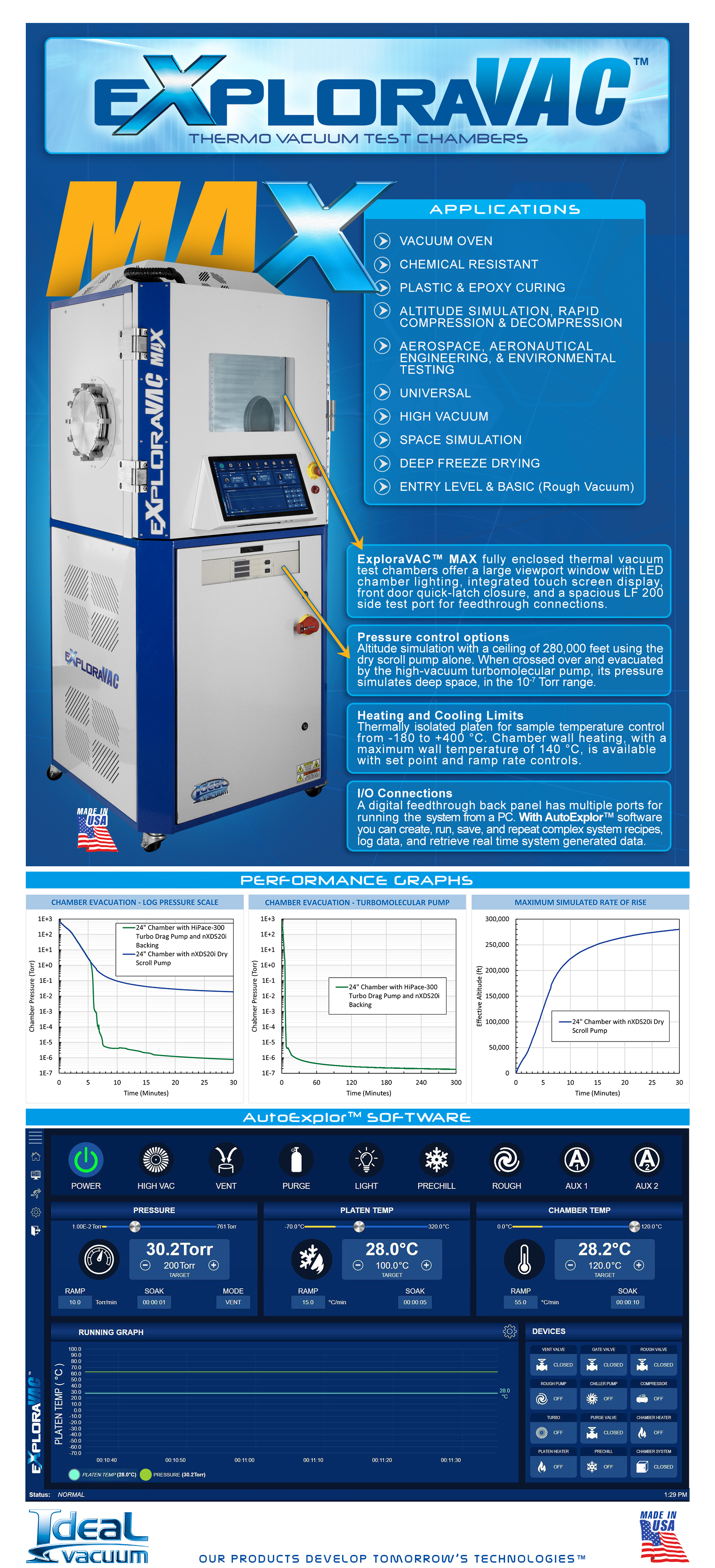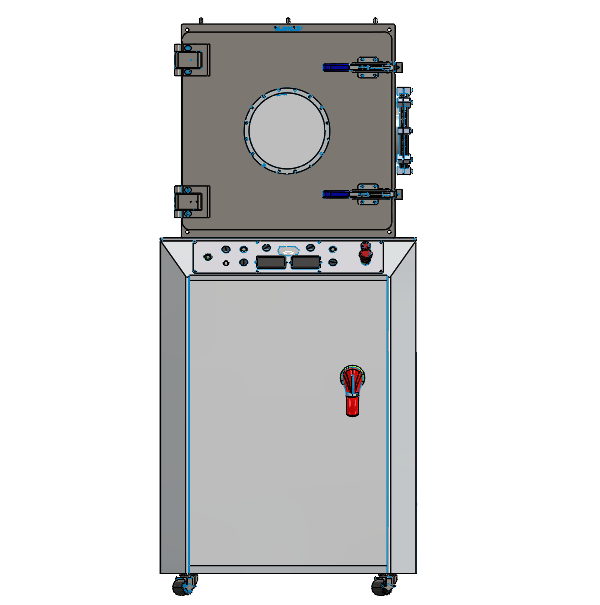This is our Altitude Simulation
ExploraVAC TVAC thermal vacuum test chamber system, ideal for pressure control experiments including rapid compression and decompression testing. It operates in the range from ambient to 280,000 feet and is accurate to within the limits of the built-in vacuum pressure gauge sensor. It is a fully integrated, turnkey, rough vacuum system, featuring a large 24 inch cubic welded stainless-steel vacuum chamber, a hinged stainless steel door with viewport, and a volume of 8.0 cubic feet. This system includes an Edwards nXR60i dry roots vacuum pump. As configured, this system has a ceiling of 280,000 feet and a rate of rise as high as 22,500 ft within the first minute. Chamber venting is controlled by our smart Ideal Vacuum CommandValve, which allows chamber pressurization at rates of up to 10 Torr per second, which is more rapid pressurization than an object feels in free fall. The operator can select preferred pressure units in Altitude, Torr, Atmospheres, Bar, Pascals, or PSI. This Altitude Simulation, Rapid Compression, and Decompression
ExploraVAC TVAC system can reach an ultimate pressure of 20 mTorr and has a heated and cooled platen which allows sample temperatures to be activly ramped from -40°C to +225 °C, accurate to ± 0.3°C. With an average ramp rates of 6°C/min for heating, and 2°C/min for cooling. It weighs 1146 lb., and requires single phase 208-240 VAC, 50/60 Hz, at 38 Amps.
See the performance graph PDF download below for all option's performance data.
ExploraVAC Altitude Simulation System Configuration:
- 24 Inch Cube Welded Stainless Steel Chamber
- Stainless Steel Front Chamber Door with Viewport
- Full Vacuum Pressure Control
- Purge Ports
- Heated/Cooled Platen
- Platen Temperature Range: -40°C to +225°C
- Platen Ramp Rate: 6°C/min heating, 2°C/min cooling
- Edwards nXR60i Dry Roots Vacuum Pump
- QTY2 LF-200 Side Ports (Allow for a variety of feedthroughs to be added from either side of the chamber)
The
ExploraVAC series of TVAC thermal vacuum chamber process and test instruments create precise environments empowering the operator with complete control over internal chamber pressure and temperature. They are built with innovation in mind. They allow for prototype device exploration in vacuum during the product research and development phase and for precise process control in small batch processing. These thermal vacuum test chamber instruments are designed to allow users to quickly tailor experiments to gather product analysis and diagnostics data as the product is subjected to the extreme stress factors of vacuum and temperature.
ExploraVAC TVAC thermal vacuum test chambers are completely configurable with many available system options (see product configurator above).
ExploraVAC System Configuration Options:
- Roughing Pump (dry scroll or dry multi-stage roots, various speeds)
- High Vacuum (various speeds)
- Full Vacuum Pressure Control
- Heated and Cooled Platen
- Chamber Wall Heating
- Integrated Chamber Lighting
- Closed-Loop Refrigerated or LN2Cryogenic Cooling System
- Automated Software Control
- Remote Control Operation
- Purge Ports, Chamber Shelving, and Much More
A large selection of vacuum chambers is available for
ExploraVAC, including welded stainless steel chambers with (internal) cubic sizes (12, 16, 20, or 24 inch) or Ideal Vacuum Cube™ modular chambers with (internal) cubic sizes (9, 12, or 24 inch). Chambers can be configured with aluminum or stainless steel doors, with or without viewports.
The
ExploraVAC TVAC system cabinet has a conveniently angled front panel control surface with colored LED pushbutton interface which controls all chamber functions. PID controllers and gauges are installed as required for user selected options. A PLC manages system functions including pump and valve sequencing for efficient pump down cycles and safety interlocks for preventing equipment damage. The front accessible, built-in NEMA style enclosure houses the electronics needed for system operation.
A spacious LF-200 side port is available for user-selected or designed accessories, such as an electronic feedthrough for device monitoring or shock testing, an infrared lamp array for radiant heating or temperature differential tests, or an ultraviolet lamp array for ionizing radiation tests. This system could be customized to obtain any desired rate of rise by adding additional vacuum pumps mounted outside the cabinet.
The back of the cabinet holds a bulkhead feedthrough panel for chamber venting, pump exhaust, and the purge gas option. A digital feedthrough back panel has multiple ports including a DB9 connector for running the system remotely from a workstation or laptop running Microsoft Windows 10 or 11 with our
AutoExplor™ software.
The (non-expiring) basic version of
AutoExplor (P1012102) allows a user to manually control devices while protecting the system.
AutoExplor properly sequences pumps and automatically operates the correct valves for a given request. The user can program pressure and temperature setpoints, ramp rates, soak times, and venting (if the system is equipped with those hardware options). The software provides real-time graphical data streaming so the user can visualize system behavior.
AutoExplor maintains an internal preventive maintenance schedule and notifies the user when system service is due. For example, it notifies when scroll pump tip-seal replacements are needed and when sensor calibration is due. This helps keep the system at peak operating performance. It also provides fault and error messages along with specific troubleshooting information in the case of a device failure so that the issue can be corrected as soon as possible.
The premium version of
AutoExplor (P1012100) includes all the features of the basic software package (above) and adds automated recipe control, data logging, and log export capabilities. Complex test recipes can be created as a step-by-step process, where each step can control the on/off state, setpoints, and ramp rates of multiple devices. One or multiple end conditions for each recipe step may be set using logical operators. The premium version allows the user to quickly generate environmental TVAC test reports from recipe data log files. Logs can be reviewed to ensure targeted process parameters are achieved. The premium version also includes
AutoExplor IP Client, which gives the software the ability to be used as a host that can manage multiple external network clients, and
AutoExplor API (application programming interface), which allows a scientist or programmer to integrate an
ExploraVac instrument into their existing software test suite without using
AutoExplor’s software interface. The premium version must be renewed annually or it reverts to the basic version.
The
ExploraVAC series of TVAC pressure and temperature-controlled test chambers are a perfect solution for many product testing requirements.
Sample Applications
- Environmental Testing Chamber
- Altitude Test Chamber
- Space Simulation Test Chamber
- Thermal Shock Chamber
- Aerospace & Aeronautical Engineering Test Chamber
- High Altitude Flight Component Testing
- Vacuum Oven
- Vacuum Freeze Drying
- Plastic & Epoxy Curing & Outgassing
About Altitude Simulation:
Many industries need to design, test, and validate parts, components, and electronics that can operate under variable pressure or rapid pressure swings. Aerospace and aeronautical engineers must design components that can handle takeoff, landing, and cruising at high altitude for both continuous use in commercial aircraft and extreme stress in military or acrobatic aircraft. Many aircraft components must be able to survive emergency situations such as rapid decompression at altitude inside a pressurized cabin or compartment, rapid pressurization as the aircraft takes an unexpected dive, or rapidly changing and differential pressures found in storm systems.
The automotive industry must make cars that can drive at any livable altitude, from below sea level to 19,300 feet of elevation. Medical respirators and other devices must perform at ground level and in life-flight airplanes and helicopters. Even consumer electronics, such as cell phones and laptop computers, must be able to handle being placed in an unregulated cargo bay during a trans-oceanic passenger flight.
It is very difficult and expensive to test components at true altitude, especially if the altitude must rapidly change. It is often better to use an altitude simulation chamber with a controlled interior pressure. Ideal Vacuum’s
ExploraVAC Altitude Simulation Test Chambers deliver precise pressure and altitude control with ramp rates and setpoint control accurate to the built-in gauge value. The preconfigured Altitude Simulation
ExploraVAC model has a chamber pressurization rate of 10 Torr per second, which is faster pressurization than an object feels at terminal-velocity free-fall in the earth’s atmosphere, sufficient for most ASTM and MIL-STD rapid pressurization standards. It also has a maximum simulate rate of rise of 22,500 feet per minute, sufficient for commercial aircraft flight simulations. Smaller chamber sizes and/or greater pumping speeds are available to meet MIL-STD-810-G rapid decompression standards or to simulate military aircraft or rocket takeoff. Explosive decompression testing apparatus are also available upon request.



![]() eDrawings Viewer For Windows
eDrawings Viewer For Windows![]() eDrawings Viewer For MAC.
eDrawings Viewer For MAC.